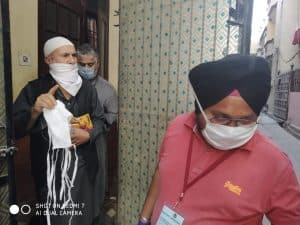Ghulam Mohammed Meer, a 61-year old Kashmiri Muslim, is a worried man. His brow furrowed with worry lines, he sits brooding over a cup of tea in a corner of his rented accommodation, which he shares with 11 other fellow Kashmiris, in Mori Gate Mohalla of Chandigarh. “I am stuck here for the past 22 days,” said Meer, his voice choked with emotion. “I badly need to go home bad. My 105-year-old father is on his death bed. He just wants to meet me one last time before saying his final good bye”.
Meer, a resident of Karalpura village of Kupwara, a militant activity area where violence has been a way of life for years now, has been visiting Chandigarh for the past 30 years to ply his trade—selling shawls, carpets, bed sheets and other Kashmiri products. Sajjad, a youngster who had accompanied Ghulam to Chandigarh, was equally sad and sombre: “These days I don’t have anything else to do except dream of the Kashmir valley and my family back home.”
Meer is part of a group of 21 Kashmiri traders who had come to Chandigarh in the winter months, as they have been doing for decades, to sell their goods and make some money. “The majority of us still have to collect our monies from our clients, but we are ready to forego that,” said Meer. “We have built up strong relationships over the years and we are sure we can get it next year. As of now, we just need to get home,” added Ghafoor, another youngsters who worked as a labourer.
To their good fortune, the Kashmiris have found unconditional support from the local population. Their pockets are nearly empty, but they do not have any dearth of food and rations. For the local grocery store owners have opened a line of credit for them. Recently, two NGOs, the Chandigarh State Legal Services Authority (SLSA), in collaboration with the Association of Professional Social Workers and Development Practitioners (APSWDP), volunteered to provide 15 days of ration to the Kashmiris. “We visited them and found that they did not have a proper cooking medium,” said Vivek Trivedi, covener APSWDP. “So, we also provided them a food heater”.
The local community, mostly Hindu families, have virtually adopted these Kashmiri migrants in their hour of need. This, during a time when Tablighi Jamaat has come to dominate the media discourse across the country. “We have known these people for a number of years now,” said Kamleshwar Sharma, a householder who lives in the same locality. “They are like our brothers. We can see through the nefarious designs of those who want to divide our nation in the name of religion. That won’t work here. As long as we are around, this group of Kashmiris are most welcome to stay in our midst”.
The Kashmiris echo the sentiment, as they are primarily concerned with earning a livelihood to support their families back home. “I am totally at a loss to understand the mentality of people back home who spend their time trying to provoke others in the name of religion or separatism,” said Sajjad.
Dr Sumit Arora, a PhD in sociology and a volunteer with APSWDP says that the COVID 19 virus is no respecter of community or class. “We can combat this disease only if we root out discrimination from our society,” said Dr. Arora. “We must realize, humanity is above all religions”.
These 21 Kashmiris will certainly agree Chandigarh’s residents have lived up to that sentiment.

Good story Raj. In these difficult and uncertain times its local communities and citizen groups that are coming together to lend support and documenting these accounts brings hope and inspires others to step forward too.